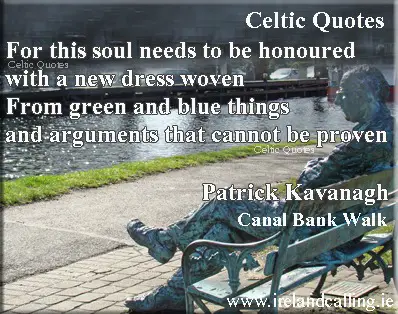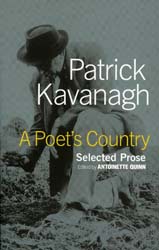Canal Bank Walk is one of Patrick Kavanagh’s most joyous and spiritually uplifting poems. It was written following a traumatic period of his life. In 1954, Kavanagh was diagnosed with cancer and had to have a lung removed.
He was aware that he might have died and the realisation brought about a change in his attitude to life.
While recovering after the operation, Kavanagh liked to walk along the banks of the Grand Canal in Dublin. It was a beautiful and peaceful walk and it helped him recover his enthusiasm for life.
Back to nature for Kavanagh
Kavanagh had been raised as a farm labourer and so was fully aware of the hardships rural people had to endure. Writing helped him escape the drudgery and he moved to Dublin to make his name. As he settled into city life, he left the countryside behind and began to mix with the Dublin literary set.
Although rural life remained as the main subject for his writing, in his new surroundings he began to drift further from his roots. Canal Bank Walk describes how he begins to reassess his life, both emotionally and spiritually.
Leafy-with-love banks … pouring redemption
Canal Bank Walk opens with the evocative phrase “leafy-with-love” banks. The banks of any canal or river are likely to be leafy but with the newfound enthusiasm of a man who has escaped death, Kavanagh gives them an extra quality. The banks are leafy with love in the sense that they are created out of love, and have grown verdant because of the abundance of that love.
Canal Bank Walk is a perfect sonnet of 14 lines with an A B, A B rhyming structure and ending with a rhyming couplet.
Where does that love come from? Presumably from the love of God, as Kavanagh goes on to say that the banks and “green waters” are “pouring redemption” for him so that he does the “will of God”. The canal and its waters therefore are performing a kind of baptism for him, so that he is born again to see life anew as if for the first time.
Now he will return to his roots and “grow with nature again as before I grew”.
The fifth line introduces new ideas. The “bright stick trapped” perhaps evokes the idea of the bright city lights and literary ambition that once consumed Kavanagh finally being tamed and put in its place. The “breeze adding a third Party” may refer both to nature and the Holy Spirit reasserting themselves in Kavanagh’s life.
The theme of nature and God intermingling is continued with the bird building its nest “for the Word”.
O unworn web enrapture me, encapture me in a web
The Word is the word of God – literally, the command to go forth and multiply but more generally… to live and to glorify God in doing so.
Canal Bank Walk was first published in 1958 in the collection, Come Dance with Kitty Stobling.
Kavanagh then puts forward his personal plea:
O unworn world enrapture me, encapture me in a web
Of fabulous grass and eternal voices by a beech
This world of nature is “unworn” because it has not been tainted by the material world but also because it has not been “worn” in recent years by Kavanagh himself as he became preoccupied with the city and literature. That’s something he wants to change. Now he wants to return to God and to nature.
The final rhyming couplet sums up Kavanagh’s need as he is reborn after his life-saving operation.
His soul needs to return to nature in the green of the countryside and the blue of its skies. The “arguments that cannot be proven” brings us back to God…whose existence cannot be proven by any form of discussion as it is a matter purely of belief. For now at least, Kavanagh has had enough of such intellectual discussions that can come to no definite conclusion.
He simply wants to “do the will of God” and sink back into the natural world around him.
Canal Bank Walk is one of Kavanagh’s most positive and life-affirming poems. It was voted the eighth most popular Irish poem of all time by readers of the Irish Times.

Canal Bank Walk
Leafy-with-love banks and the green waters of the canal
Pouring redemption for me, that I do
The will of God, wallow in the habitual, the banal,
Grow with nature again as before I grew.
The bright stick trapped, the breeze adding a third
Party to the couple kissing on an old seat,
And a bird gathering materials for the nest for the Word
Eloquently new and abandoned to its delirious beat.
O unworn world enrapture me, encapture me in a web
Of fabulous grass and eternal voices by a beech,
Feed the gaping need of my senses, give me ad lib
To pray unselfconsciously with overflowing speech
For this soul needs to be honoured with a new dress woven
From green and blue things and arguments that cannot be proven.


